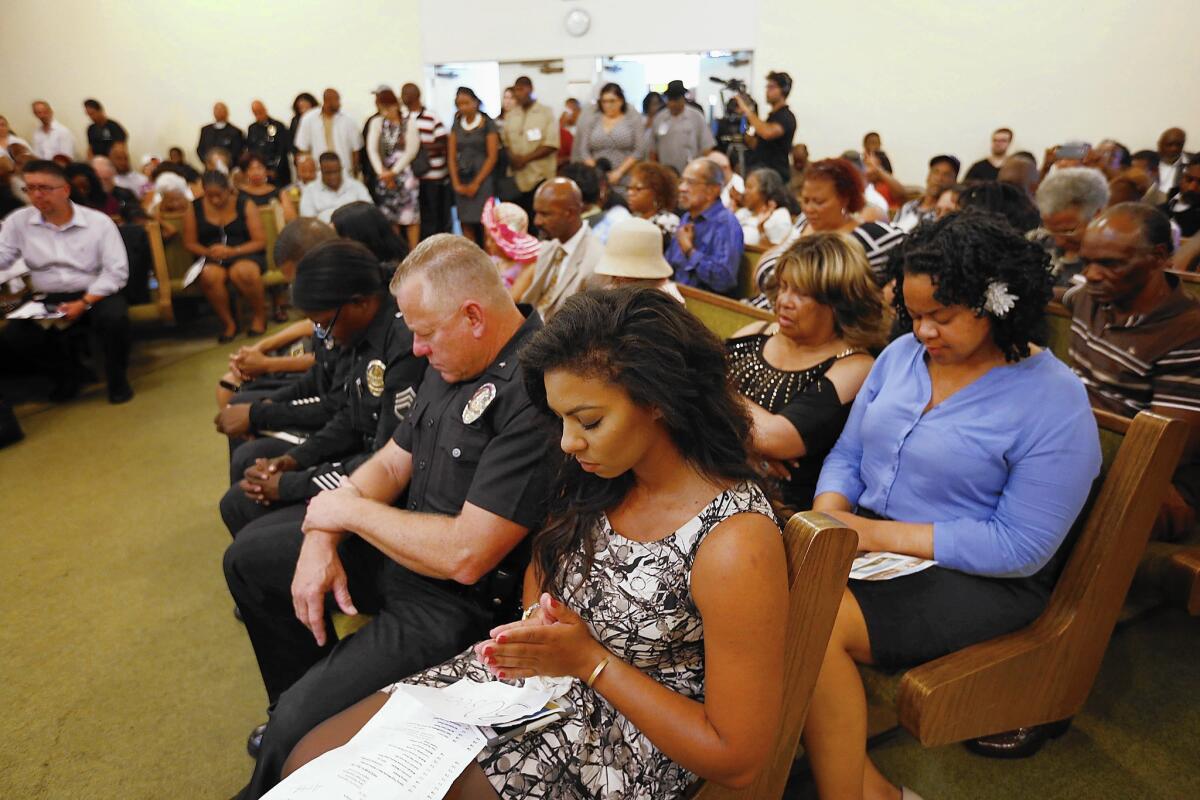A rise in violence plagues South L.A.: ‘We can’t police our way out of this’

- Share via
Thirty minutes before the meeting at a South Los Angeles church was supposed to start, the parking lot was already full.
Hundreds of people packed the pews of Hamilton United Methodist on Sunday — so many that some were left standing even after the choir lofts were filled. There were elected officials, community activists and gang intervention workers. LAPD commanders and a police commissioner. There were mothers whose sons had been killed on the city’s streets, and one man who had been shot himself a month ago.
Their goal: Stop the violence plaguing South L.A.
“We’re going to take our communities back,” City Councilman Curren Price said. “We can’t police our way out of this, can we?”
The crowd erupted in applause.
Councilman Marqueece Harris-Dawson had organized the gathering just days before, looking for a way to give South L.A. residents a chance to talk about a recent rise in violence — particularly in the number of killings. He said he wanted to give people a chance to talk about how it was affecting them, to make sure their voices were heard by officials and police looking for solutions.
“What’s very clear in here is there’s much more to the story,” Harris-Dawson said, “whether it’s a gunshot survivor or a mother who lost her child or a police officer who thought he had it in check.”
As of Sept. 5, 191 people had been killed in Los Angeles this year — up 4.4% from the same period in 2014, according to Los Angeles Police Department data.
August was particularly deadly, with 39 people killed across the city, the most in a single month since July 2009. Nearly half of August’s killings occurred in South L.A.
NEWSLETTER: Get the day’s top headlines from Times Editor Davan Maharaj >>
LAPD officials and South L.A. leaders have been working to quell the violence, which police attribute largely to gang activity. More officers have been patrolling hot spots, and the department has increased community outreach efforts and sought help from clergy and gang intervention workers.
On Sunday, LAPD Deputy Chief Bill Scott said that 80% of the homicides in South L.A. this year were related to gang violence. But, he said, a lack of educational opportunities, jobs and other programs to help improve the community also played a role.
Social media also was helping to fuel the aggression, he said, citing an August shooting in which a photo of two men lying bloody on the sidewalk circulated on Instagram and Twitter.
Those types of posts are “gonna cause problems,” Scott said. “We have to come up with some solid solutions.”
Activists, residents and others in the audience called on the politicians in the crowd — including Reps. Karen Bass and Lucille Roybal-Allard and state Sen. Holly Mitchell — to bring more resources to their neighborhoods. More money for gang intervention programs. More jobs and programs for young people.
Aqeela Sherrills, an activist known for working to curb gang violence, said intervention workers are crucial to reducing violence because they live and sleep in the neighborhoods most affected.
“This has to be a long-term strategy,” he said as people in the audience nodded. “We have to be looking at training the next generation of interventionists.”
Other residents looked to their neighbors, saying it was up to the community to protect their children.
“We have to police our own selves,” one man said. “Go home at night and make sure your kids are home.”
Thomas Wilson spoke through a jaw that was wired shut, the result of gunfire outside a Manchester Square carwash. He was one of the two men in the photograph Scott had mentioned. The other, Delshon Eugene Hayes, was killed.
Responding detectives thought he was dead and didn’t help him soon enough, Wilson said, and the delay allowed bystanders to snap photos of his body sprawled on the sidewalk.
Later, Scott apologized to Wilson.
As the meeting broke up, Tanya Summerise-Carter walked toward the church doors. Written on the back of her T-shirt were the names of two of her sons, killed in shootings 12 years apart.
She has one son left, she said, and she will do everything she can to keep him safe. So the community must get involved.
“It’s our kids that are doing the killing,” Summerise-Carter said. “And it’s our kids that are getting killed.”
Twitter: @katemather
ALSO
Valley fire spread with ‘mind-boggling’ speed, experts say
San Diego County and the DMV are partnering to help newly released inmates
UC appeals after judge finds sexual misconduct investigation unfair
More to Read
Sign up for Essential California
The most important California stories and recommendations in your inbox every morning.
You may occasionally receive promotional content from the Los Angeles Times.











